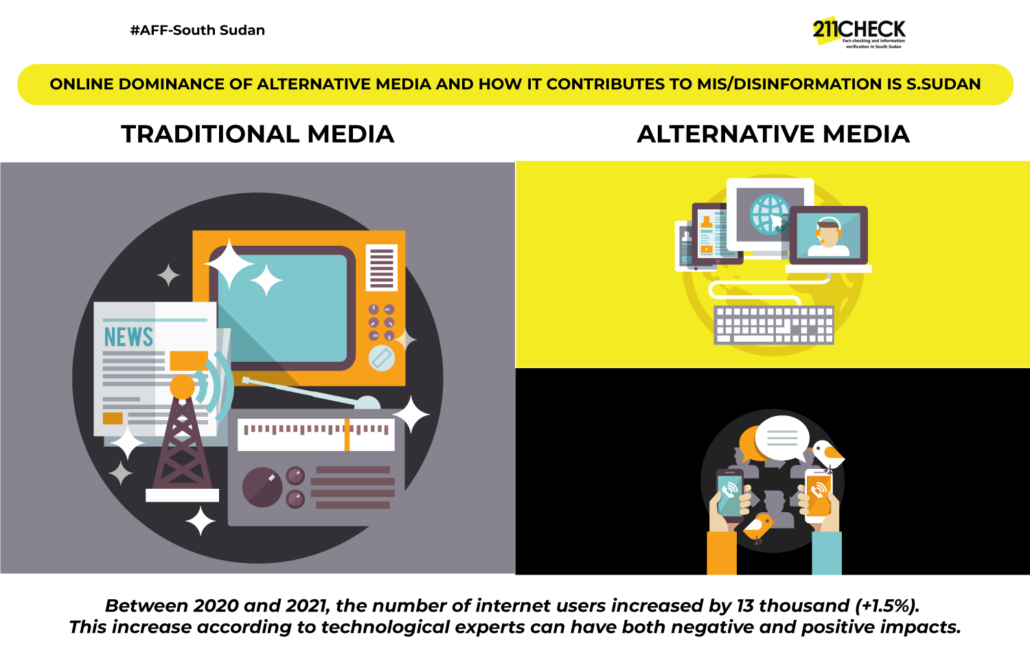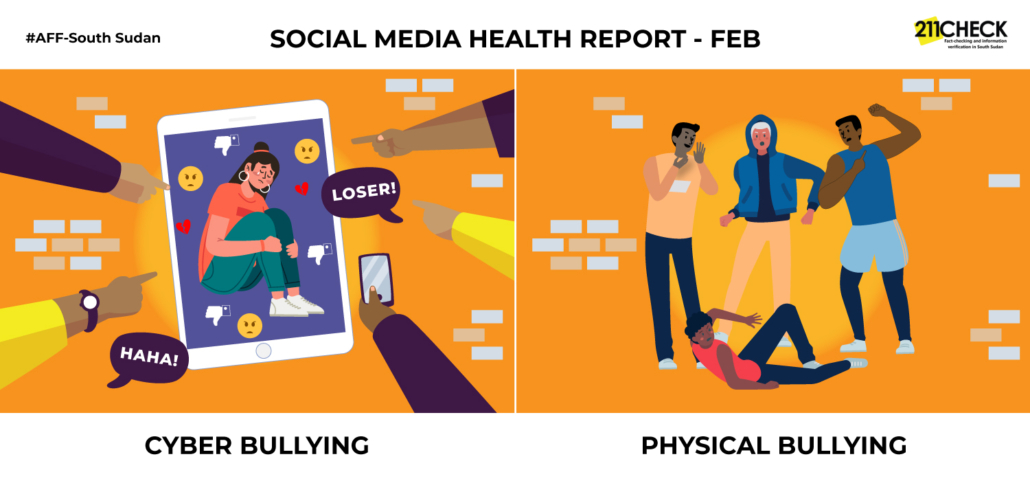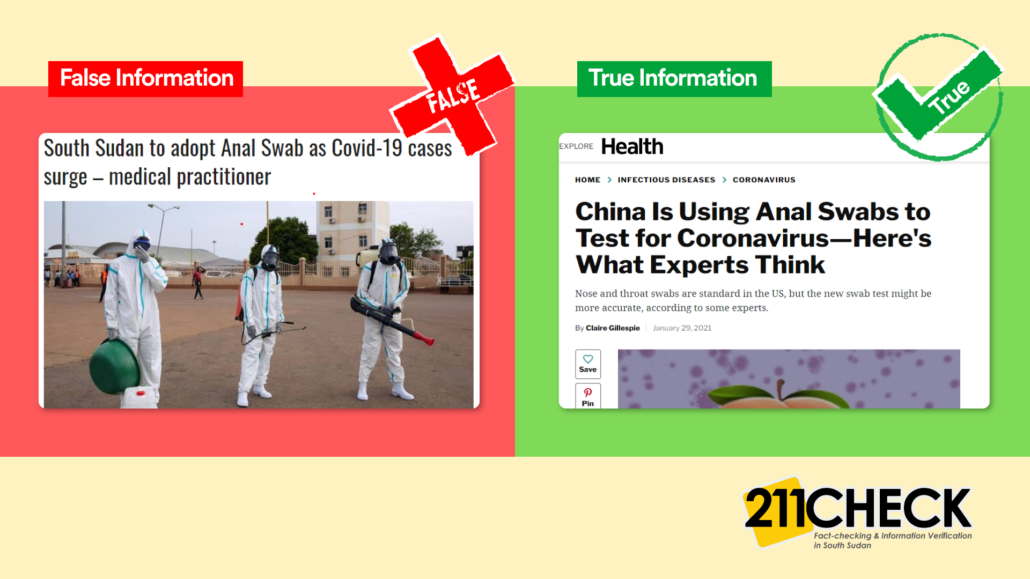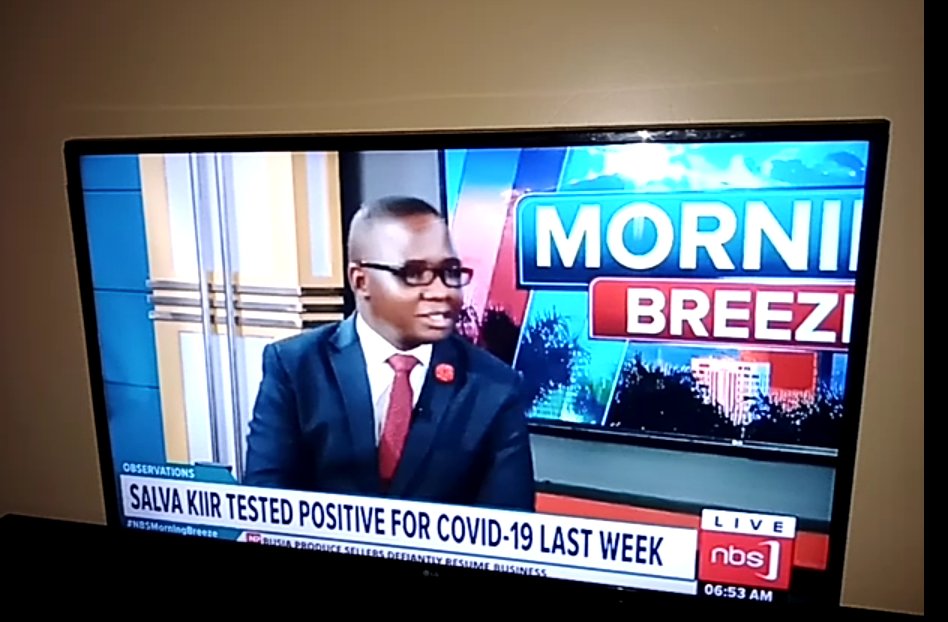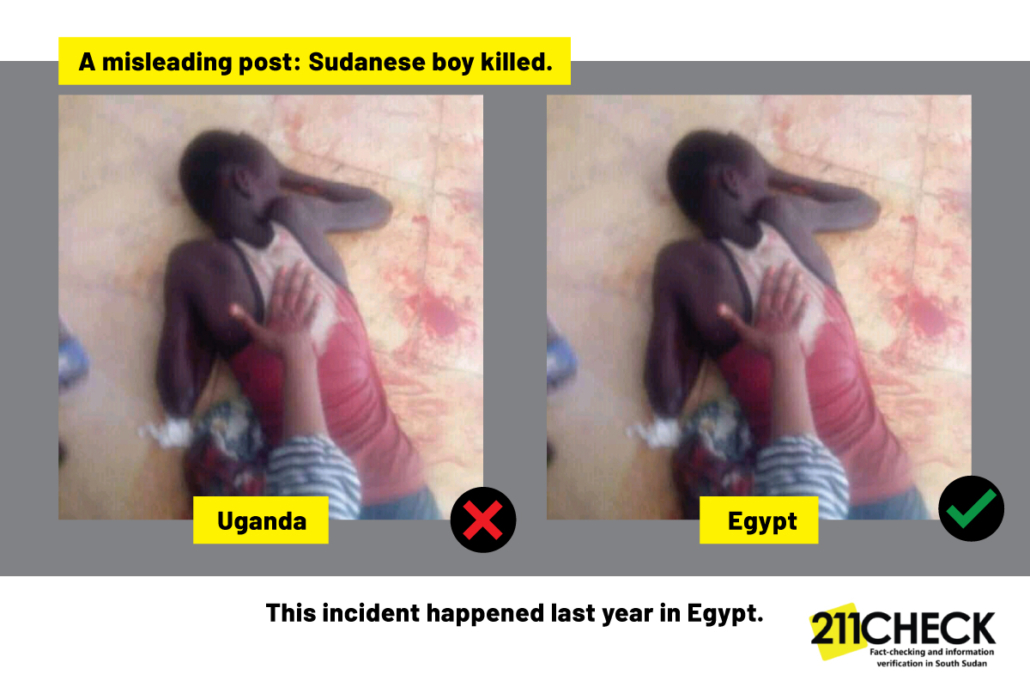The Online dominance of alternative media and how it contributes to mis/disinformation in South Sudan
A report compiled by Okech Francis and Emmanuel Bida, AFF-South Sudan fellows
Background
In South Sudan’s current developing media landscape, social media has become a national phenomenon and can be considered a mutiny to the news environment. This is because various users create their own content and curate the flow of information differently for public consumption.
According to the Digital 2021 South Sudan Hootsuite report, in January this year, there were 900.7 thousand internet users across the country. Between 2020 and 2021, the number of internet users increased by 13 thousand (+1.5%). This increase according to technological experts can have both negative and positive impacts.
Several other kinds of research reveals that social media has extended beyond everyday interpersonal communication and ‘life-sharing’ to the (quasi-journalistic) gathering and sharing of news information. The ease with which information is published and shared online challenges the long-established connection between the press and society, with journalists playing a mediating role as gatekeepers.
In addition, the possibility to comment, like, share, and follow news online has increased audience involvement with the news. For example, people, especially the young, increasingly get the most unverified and fact-checked news through social media – interactions that are habitually geared by Alternative Media.
As news circulation increasingly takes place through social media like Facebook and Twitter, which are regularly used by South Sudanese abroad and a few within the country, online sharing and discussions can create widespread mis/disinformation on certain issues or actors. Numerous researches reveal that when news spreads across social media, this increases attention to the story, ultimately influencing the (online and offline) public agenda.
In order to deepen and analyze South Sudanese online interactions on Alternative Media’s planetary, especially on how they handle their stories, #defyhatenow – Africa Fact Checking Fellows have been monitoring their various Facebook pages and Twitter handles.
The prominent media houses featured in this brief included, Juba TV, Hot in Juba, Nyamilepedia, Visit South Sudan, Smart Family TV, Sixty 4 Tribes Press, The South Sudan Herald, Ramciel Broadcasting, Bentiu TV, among others.
Mis/disinformation related Stories on Alternative Media
Below are some of the few examples of mis/disinformation related stories that were poorly handled by the mentioned particular alternative media houses.
1. Nhial Deng alleged story of having tested positive for COVID-19, posted by Sudan’s Post:
The story was refuted by the Office of the President:
The above story published by Sudan’s post alleged that Nhaial Deng, the Presidential Affairs minister was among those that tested positive for covid-19, together with Ateny Wek Ateny, the Presidential Press Secretary in the Office of the President.
This story that had created vast debate online turned out to be false. According to their comments, many online users believed the information. But after the widespread, the Office of the President in a late manner dismissed the fake news.
2. President Kiir’s alleged resignation rumour.
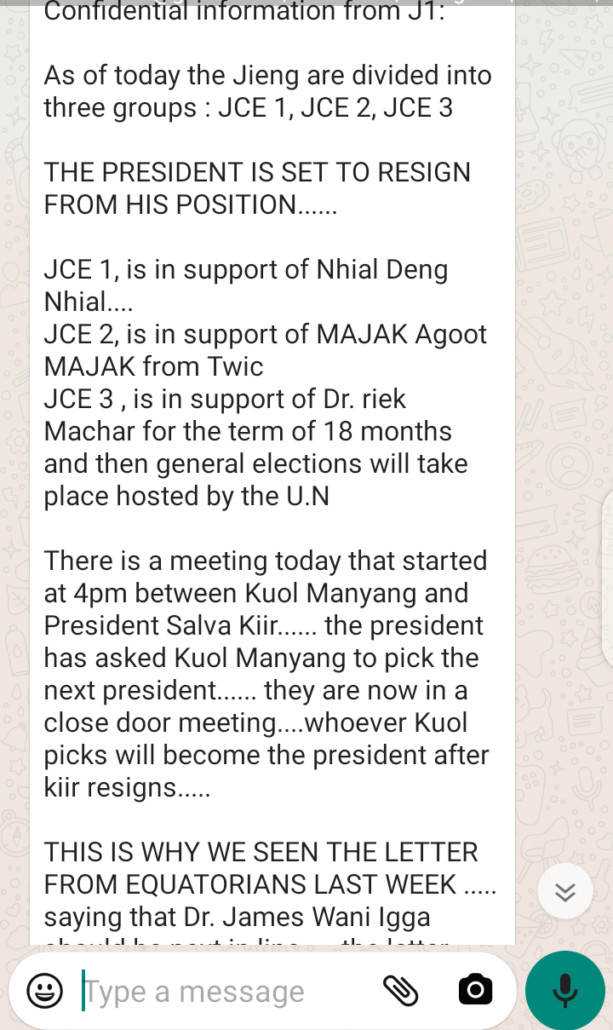
As seen in the above screenshot, a message circulated on various WhatsApp groups stating that the President was set to resign. According to our analysis, this story could have likely caused divisive politics, hence triggering conflict in the country. But it was later fact-checked and found to be untrue – a move which reduced the anticipated panic.
3. Another sensitive story was shared by a South Sudanese who stated that Ugandan authorities/thugs killed a South Sudanese boy in Kampala.
After thorough research and fact-checking, we discovered that the story was actually a modification of a post made by the same person that a South Sudanese boy was killed in Egypt. The individual merely changed Egypt to Uganda. This is an example of unhealthy news that can negatively affect South Sudan’s relationship with its neighbours and may harm Ugandans in South Sudan.
Find the link to the story fact-checked by 211 Check.
4. Controversies regarding the Minister of Education’s statement on the national Primary Leaving Examinations for opposition areas.
Late last month, Awut Deng Achuil – General Education and Instruction minister issued a statement regarding the final fate of the primary national exams. In the statement, she mentioned that due to insecurity, students in opposition-controlled areas of Jonglei, Upper, Unity States and some government areas (Warrap) would not access the national exams, but this story was misreported by some Alternative Media, which created online wrangles filled with mis/misinformation.
Its negative implications left the civil population to wonder whether peace parties were truly in a unity government if they are not able to coordinate amongst themselves. It was taken as a political rivalry between the SPLM-IG & the SPLM-IO. However, the students later sit for their exams after a number of engagements.
Trending Stories
During the monitoring period, the leading stories included:
- Controversy over delayed Certificate of Primary Education Examinations for pupils in SPLM-IO controlled areas of Jonglei and the Upper Nile States.
- Mass Leakage of the Certificate of Primary Education examinations, with the education ministry being blamed for poor exams regulations. This was shared on multiple pages.
- Mary Boyoi’s visit to Tanzania to feature Harmonize in a song, “All I Need”. The story was shared on multiple pages.
- Government’s failure to meet the February 15th deadline for reconstitution of National and State Assemblies. Multiple Pages shared the story.
- The story about South Sudan adopting the anal swab as COVID-19 cases surge.
- The arrest of drug traffickers trying to smuggle heroin via Juba International Airport (shared on multiple Pages).
- Achair Wiir intervenes to clear South Sudan UN debts (shared on Blog/Website).
- Ateny Wek Ateny, South Sudan’s Presidential Press Secretary tests positive for COVID-19; Nhial Deng Nhial and President Kiir rumoured COVID-19 positive. (Shared on multiple pages).
- Leaked classified Information story regarding….”SPLM DECISION MAKERS RESORT TO POLITICS OF ASSASSINATION”. The story shared on 12th February had 53 Reactions, 33 Comments and 66 Shares.
- 17 year old South Sudanese boy shot dead by Ugandan Security Personnel in Kampala (13th February) – 75 Reactions, 159 Comments and 52 Shares. That was later found out to be a false story.
- An alleged story of Aggrey Sabuni, former presidential advisor on economic affairs having died of Covid-19.
Analysis
- During the monitoring period, the team noticed that there is a significant increase in the spread of fake news, with most Alternative Media engaged in the publication of sensational stories in order to capture the readership and create more viewers/followers.
- It was identified that Alternative Media regularly get their news from citizens reporters and sometimes from mainstream media. Most information from citizens reports is mostly inaccurate, unverified and can cause harm to public consumption. It is noticed that most alternative media do not investigate or fact check stories but are good at sharing content quickly in order to attract more viewership.
- AFF fellows have also noticed that the majority of Alternative Media are not active on Twitter. They mostly dominate Facebook, where many South Sudanese with low social media literacy are present. In addition, the team also identified that some Alternative Media Facebook pages have gone inactive with their last posts being before or shortly after mid last year (2020).
- Impressive move; the team also noticed that some Alternative Media have in some cases apologized to the public for publishing inaccurate information – a great professional and ethnical step.
Recommendations
In order to mitigate the spread of rumours, claims, fake news and misinformation related content online by the Alternative Media, the following should be done by the relevant authorities.
- There should be regular fact-checking and verification of questionable news items published online by the alternative media. It is always important to write to them on the verdict of their information once checked. This will help counter misinformation and encourage them to publish credible information. This can be done by fact-checking platforms (211 Check) and others.
- The team recommends that fact-checking organizations and authorities should be proactive especially in the publication of their fact checks. The team strongly recommends that 211 Check should consider promoting their social media pages to reach a large audience. This will help to counter misinformation and ensure the coverage of a wider audience.
- South Sudan National Communication Authority should capacitate its role in monitoring social media as is the case in many of the neighbouring countries. This should include requiring alternative media to acquire legality so that they are easily regulated.
- There is also a need for the promotion of social media literacy and the importance of consuming healthy information. This should be done by the Ministry of Information, telecom companies and partners.
- Government and partners should prioritize funding data-driven and online safety projects or institutions in order to bridge the already created gaps between mainstream and alternative media.
Links for Reference:

